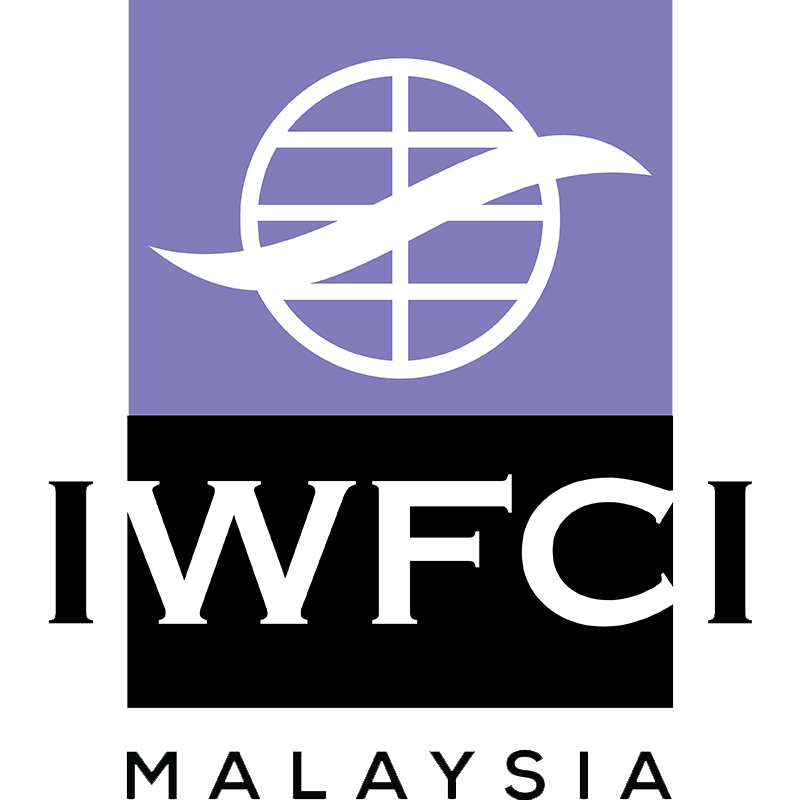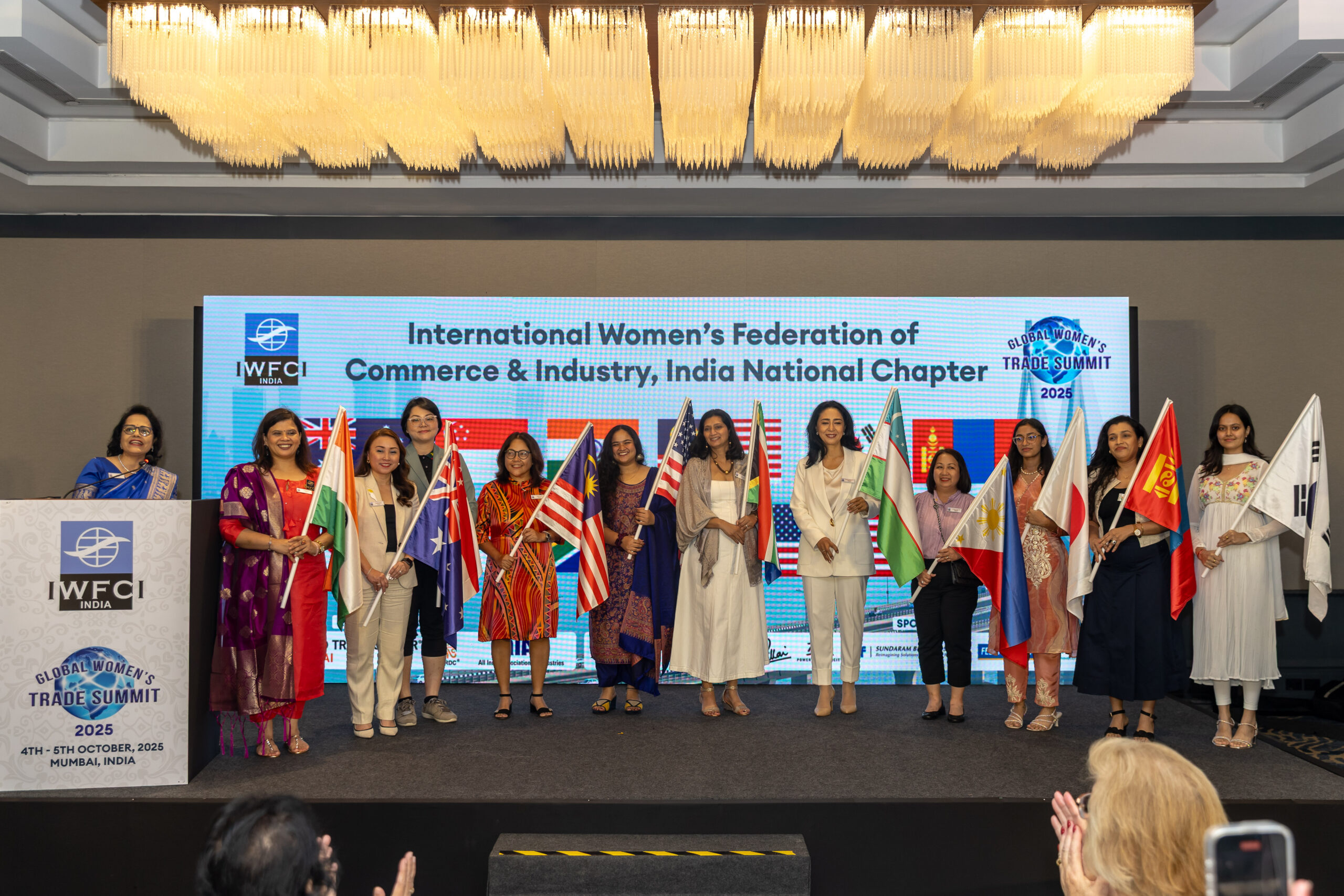Highlights from the Global Women’s Trade Summit 2025 in Mumbai, India. October 4th – 5th, 2025.
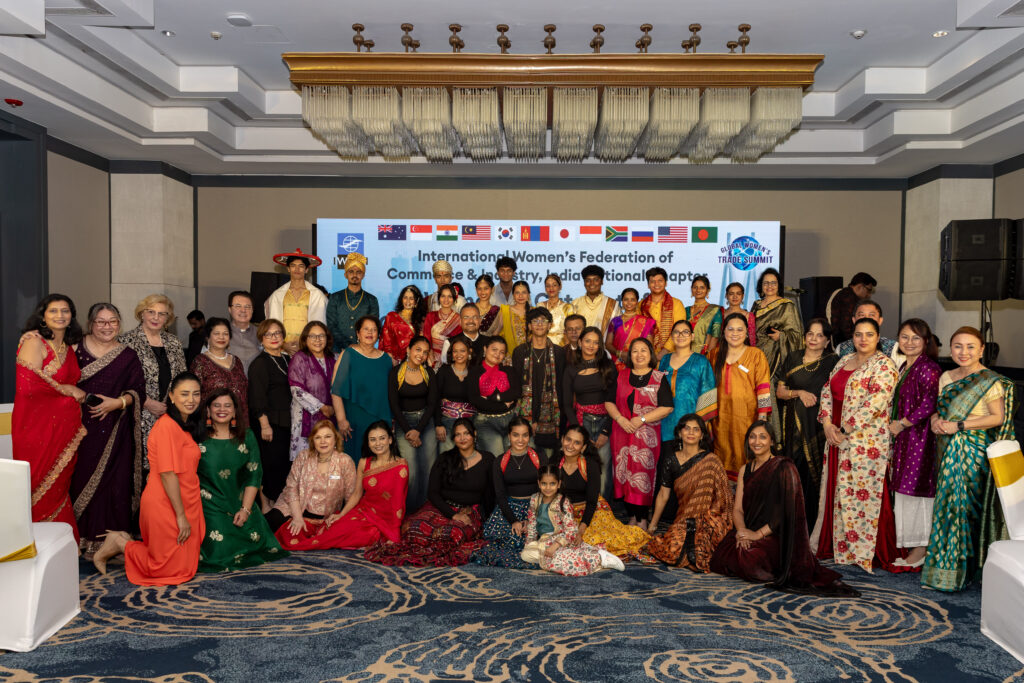
From the vibrant hall of the World Trade Center in Mumbai to the intimate meeting room(s) at the Westin Powai the Global Women’s Trade Summit 2025 (GWTS2025) was buzzing with ideas.
With the theme Women as Catalysts for Global Trade and Economic Growth, this year’s summit brought together powerhouse women from 10 countries, each with a story, a strategy, and a spark.
Here’s a look back at the six standout moments that shaped the summit — and the key takeaways that will ripple far beyond the closing ceremony.
- B2B Business Matching: Where Connections Became Collaborations
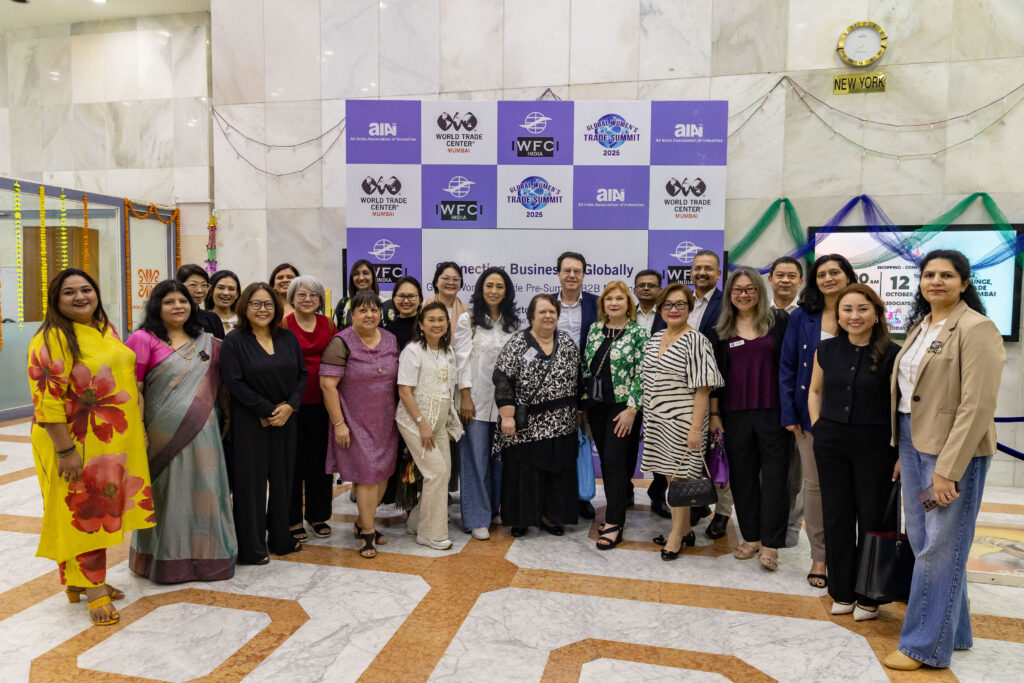
In partnership with the World Trade Center, our host, IWFCI India organized a superb B2B business matching session. It was a masterclass in purposeful networking. Delegates from across Southeast Asia, Africa, Central Asia, and Australia found common ground — and fertile ground — for future ventures.
Key Takeaways:
- Cross-border partnerships flourished.
- Delegates praised the curated matching format, which prioritized values and impact over scale.
- Several opportunities were established with key follow ups for the next steps scheduled.
2. Panel discussion on INDIA – Advantages and Opportunities for Trade and Commerce
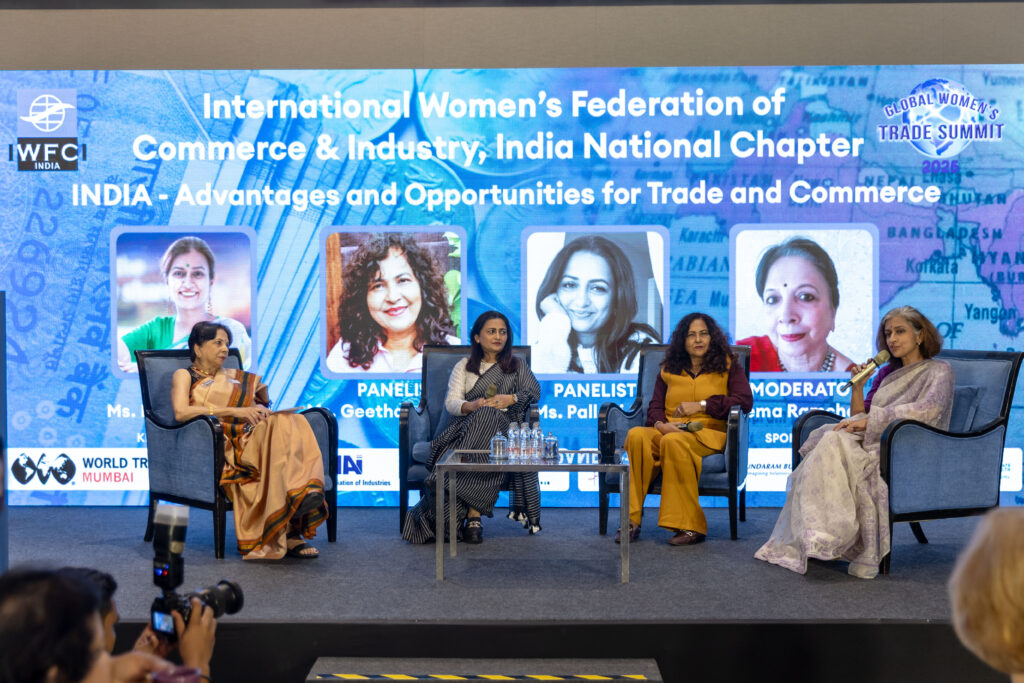
India’s panel session was a deep dive into its evolving trade landscape, with insights from three leading women entrepreneurs and business professionals as listed below:
Panellists:
- Ms Bhavana Bindra – Board Member – Radiance, Kennametal India, ASAL. Ex-Managing Director REHAU SOA, Lubrizol Imea
- Ms Geetha Nerurkar – Founder & CEO, Maxim Global Resources Pvt. Ltd.
- Ms Pallavi Gill – Chief Executive Officer, RCMPA Polishing Technologies Pvt. Ltd.
Moderator:
- Dr Rema Ramchandran – Management Consultant and Director, IWFCI India.
Key Takeaways:
- India’s digital public infrastructure (DPI) is opening new doors for global e-commerce integration.
- Women-led businesses in India are increasingly tapping into export incentives and tech incubators.
- Delegates were encouraged to explore India’s Tier 2 and Tier 3 cities for untapped market potential.
3. Panel discussion on The Power of Collaboration: Women Leaders Driving Sustainable Businesses
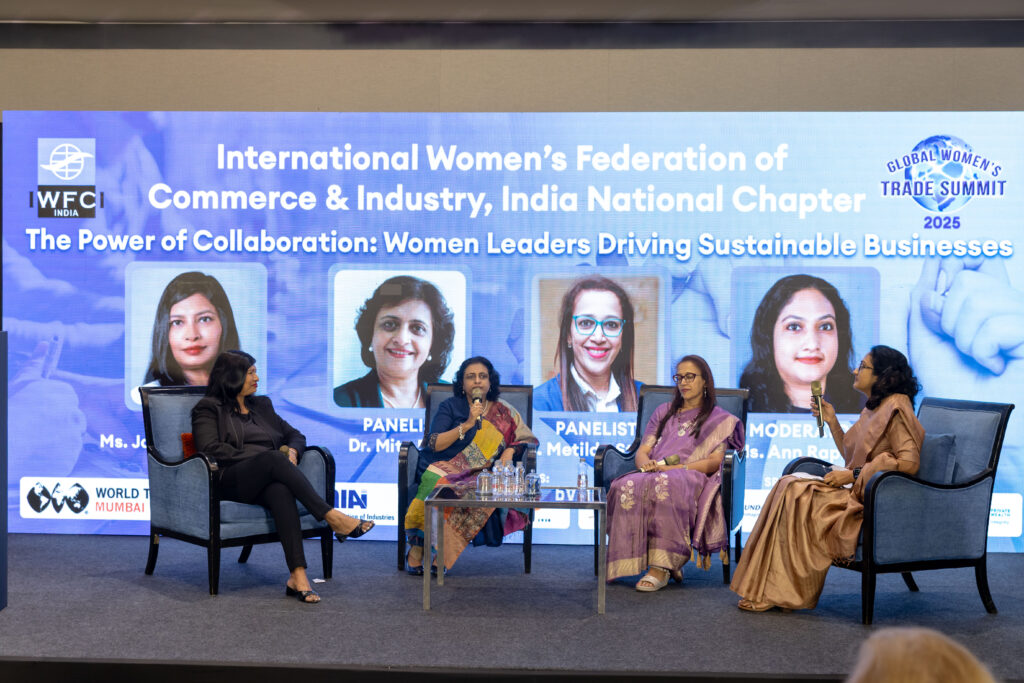
This panel was a heart-centered, strategy-rich conversation among women who’ve built businesses as well as experienced business professionals in the corporate sectors.
Panellists:
- Ms Jayati Chakraborty – Managing Director, Hapag-Lloyd AG
- Dr Mita Dixit – Co-Founder and Director, Equity Advisors Pvt Ltd.
- Ms Metilda Stanley – MD & CEO, Techsurance Private Limited
Moderator:
- Ms Ann Rapheal – Oil & Gas Consultant, Former BD, Shell
Key Takeaways:
- Collaboration is a survival strategy especially in volatile markets.
- Emotional intelligence and community trust emerged as key assets in scaling sustainable businesses.
- Women leaders are redefining success metrics to include wellness, equity, and environmental impact.
4. Workshop: Creating Your Brand in the World of AI
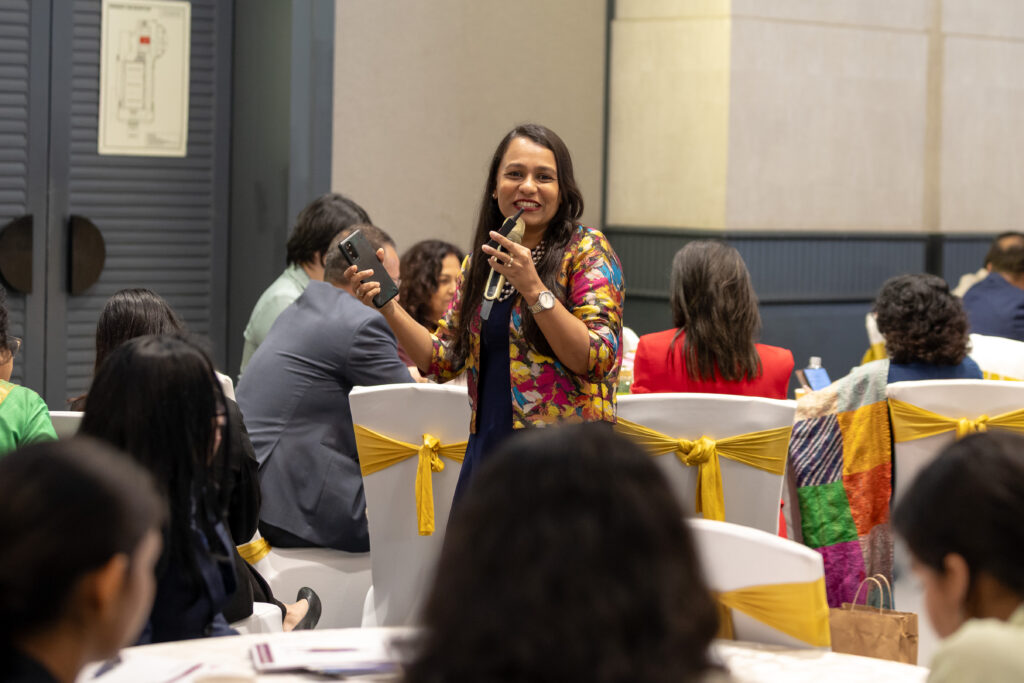
This hands-on session was a favorite among entrepreneurs and creatives alike. It tackled the tension between automation and authenticity — and offered tools to navigate it.
Facilitator:
- CA Parinita Adukia – Founder, Portraiture. Image Consultant and Soft Skills Trainer
Key Takeaways:
- AI can amplify human stories, but only if the brand voice is clear, grounded, and emotionally resonant.
- Participants learned to craft brand narratives that reflect lived experiences, not just market trends.
- The workshop emphasized the importance of cultural nuance and how women entrepreneurs should proactively right-positioning them.
5. Panel discussion on Emerging Opportunities for Women in Technology, Innovation and Global Trade
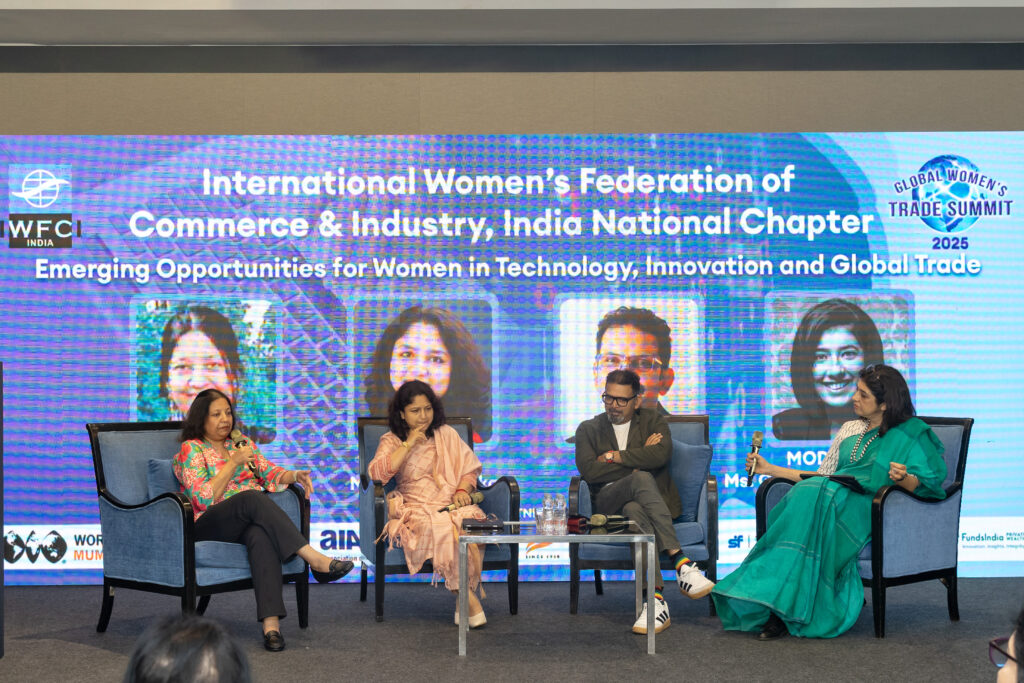
This forward-looking panel explored emerging sectors and women in STEM (Science, Technology, Engineering and Math) — from green tech to AI — and spotlighted the unique positioning of women in these spaces.
Panellists:
- Ms Priyanka Swain – Director of Engineering, Tally Solutions Pvt. Ltd.
- Ms Sonali Nimkar – Director (Data Science and AI), Capgemini
- Mr Anil Nair – Co-Founder, DeepSpot.AI
Moderator:
- Ms Geetanjali Bhattacharji – Founder, Glassbox. Founding Partner, Pollinate Labs
Key Takeaways:
- Women are increasingly leading in frontier technologies, but access to funding remains uneven.
- Adopting a growth mindset is crucial to enable us to continue learning and improve.
- Failure is the best lesson as it gives us the opportunity to learn and evaluate on what’s working, what’s not and what should be done differently.
- Do not wait for things to be perfect. Adopt an iterative approach. Just start doing and keep on improving on the approaches or methods based on the new learnings acquired.
6. Session on Empowered Women, Empowered Economies
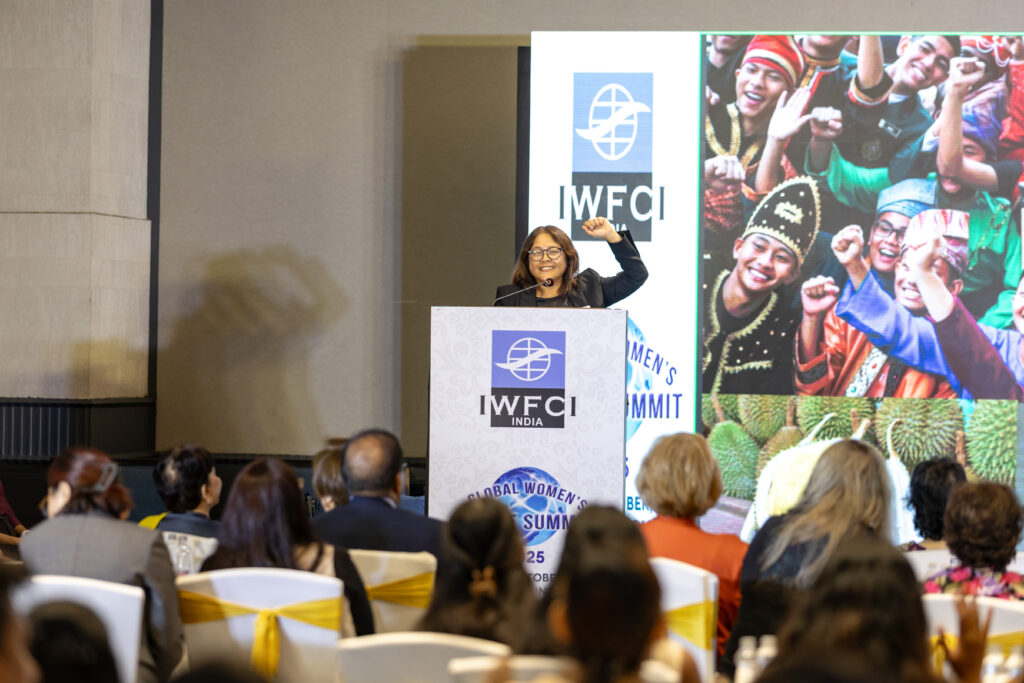
Five exciting sessions presented by the President of the IWFCI from five countries as listed below:
- Dr Daphne Pillai – President IWFCI India
- India’s Growth Story: Catalyst for a Thriving Nation
- Ms Daphne Pang – Member – IWFCI Australia
- Australia’s Advantage: Stability, Opportunity, Growth
- Ms AngeeLia Phua – President IWFCI Singapore
- Business Without Borders: Singapore’s Global Advantage
- Ms Salwana Ali – President IWFCI Malaysia
- Malaysia’s Strategic Edge in the Global Market
- Ms Vino Pillay – President IWFCI South Africa
- South Africa: The Gateway to African Markets
These sessions practically gave solid background on each country, its strengths, weaknesses, opportunities and threats. What’s important to the delegates is knowing the strengths and understanding the risks to be able to establish a sound go to market strategy in cross border trades, establishing the right partnerships and determining the best business model as relevant.
For example, Malaysia is strategically located to the 650 million people of ASEAN market with extensive ports, logistic capabilities and talented multilingual young workforce with 70 percent aged 40 and below. Generally, Malaysia has been one of the top players in the semiconductor, electronics and engineering industry with about 13 percent of market share. Currently, many multinationals are investing in Malaysia such as Microsoft – USD2.2billion, Google – USD2 billion, AWS – USD6.2 billion and many others in setting up regional and global data centers and upskilling talents in the Generative AI. Extensive public and private partnerships and collaborations are taking place in this space. The niche area that Malaysia has been leading for the past 11 years is Islamic Finance. And this is achieved based on multiprong strategies such as having the following:
- Long term policy framework
- Financial Sector Blueprint & Capital Market Masterplan
- MIFC Agenda (2006)
- Public–Private Collaboration
- Government Support
- Private sector innovation
- Product Innovation & Global Firsts
- Green Sukuk Pioneer
- Sustainability sukuk
- Digital Islamic Banking Expansion
- Aeon Bank
- BNM (Bank Negara Malaysia) Licensing Framework
- Institutional Infrastructure & Talent Development
- INCEIF University & ISRA Academy
- Shariah Advisory Councils
- Global Standard-Setting & Thought Leadership
- Islamic Financial Services Board (IFSB)
- Centralised Shariah Authorities Forum
- Islamic Social Finance & Third Sector Integration
- Waqf, Zakat, Infaq
- Wakaf Madani Initiative
- Halal Economy Synergy
- Islamic finance is a key enabler of Malaysia’s Halal Industry Master Plan 2030, supporting SMEs and ethical consumer markets.
- Malaysia leads in both Islamic finance and Halal certification, creating a unified ecosystem for ethical trade
Malaysia’s strength in Islamic Finance acts as hand-in-glove with the Halal industry. Malaysia has also been leading in the Halal industry, rated #1 in the Global Islamic Indicator. The Halal market is a USD5 trillion globally. Current opportunities are beyond food — Halal-certified pharmaceuticals, cosmetics, tourism.
In summary, Malaysia’s strengths in halal innovation, digital infrastructure, and regional diplomacy make it a rising hub for inclusive trade.
Final Reflections: What We’re Taking Home
Across all sessions, one truth rang clear: women are not just participating in global trade — they’re shaping it. Whether through bold partnerships, authentic storytelling, or values-driven leadership, the summit proved that economic growth can be inclusive, sustainable, and deeply human.
Top 10 Takeaways:
- Relationships drive results — especially when built on shared values.
- India’s trade ecosystem is ripe for women-led innovation.
- Collaboration is the new currency of sustainable growth.
- Authentic branding is a strategic advantage in the AI era.
- Emotional resonance matters as much as technical expertise.
- Malaysia is emerging as a strategic gateway for inclusive global trade.
- Women in tech need more visibility — and more venture capital.
- Cultural intelligence is key to scaling across borders.
- Storytelling is a powerful tool for impact and influence.
- The future of trade is female — and it’s already here.
The Global Women’s Trade Summit 2025 wasn’t just a gathering. It was a declaration: that women are ready, equipped, and already leading the charge toward a more connected, compassionate, and commercially vibrant world.
Let’s keep the momentum going.
